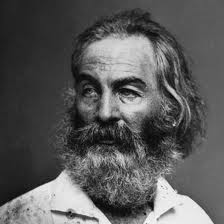Thoughts on "Art and Argument"
 |
| Walt Whitman, American Poet, 1819 - 1892 |
Many of you will recognize the phrase "art and argument" as being from Walt Whitman's "Song of Myself," the most influential poem in his masterpiece Leaves of Grass. The passage containing the phrase goes:
Swiftly arose and spread around me the peace and knowledge that pass all the art and argument of the earth;
And I know that the hand of God is the promise of my own,
And I know that the spirit of God is the brother of my own;
And that all the men ever born are also my brothers, and the women my sisters and lovers;
And that a kelson of the creation is love;
For a long time I thought that "art and argument" would make an ideal blog name but resisted it, because as presented in this passage, not just argument, but art, too, are identified as things which Whitman transcended in a moment of enlightenment, understanding, and connection, not unlike the flash of insight and awakening known in the Zen tradition as satori.
But I finally reconsidered and decided to go forward. That's because the truth is that while we are here we are embodied beings, and even when we are doing wonderful things like creating art, we always reside in a state of duality, which means a certain separation must prevail at all times. Recall that in the Garden of Eden, Adam and Eve experienced a blessed state of non-duality. It was only after being tempted by Satan in the form of a snake did they "fall" into an awareness of the fundamental existential duality of Man and Woman. Heaven, Nirvana, or Paradise can wait, right?
And when I heard Leonard Cohen singing his song "There Is a War," that sealed it for me. The biggest mistake as we seek higher things is to think that spirituality should exempt us from life.
There is a war between the rich and poor,
a war between the man and the woman.
There is a war between the ones who say there is a war
and the ones who say there isn't.
Why don't you come on back to the war, that's right, get in it,
why don't you come on back to the war, it's just beginning.
Though he first published Leaves in 1855, Whitman continued to revise it right up to his death in 1892. And while the original edition employed the phrase "art and argument," some subsequent versions deleted the word art, suggesting that art is the means of achieving enlightenment while we are embodied. I tend to agree, but consider that deletion a failure of nerve. Come on back to the war, Mr. Whitman!
I'm researching now to see how he worded this passage in his final "deathbed" version of Leaves of Grass. If you know, please comment. Regardless, I'm sticking with "art and argument"!
Comments
Post a Comment